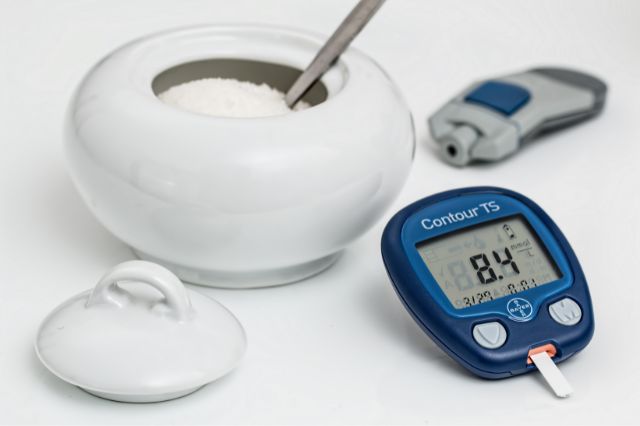Unraveling the mysteries of health and wellbeing often leads us down surprising paths. One such path reveals a compelling, but less-talked-about aspect of high blood sugar levels – their role in aging. Let’s explore the compelling narrative of Sugar Shock, and how high blood sugar stealthily hastens the aging process of your body.
The Intricate Dance Between Sugar and Aging
In the intricate dance of life, sugar, specifically glucose, plays a leading role. It’s the primary energy source that fuels our cells, keeping us active and alive. However, when the dance steps go awry, and blood sugar levels persistently run high, we enter a state known as hyperglycemia. Hyperglycemia can set off a series of damaging events in the body, much like a poorly executed dance move leading to a chain of collisions.
One such collision involves a process intriguingly named glycation. Imagine this: you have excess sugar coursing through your bloodstream. This sugar, rather than being used up for energy, starts attaching itself to proteins and fats. This biochemical reaction results in the formation of new harmful molecules known as Advanced Glycation End products, or AGEs.
Fittingly named, AGEs play a significant role in the aging process. They are like mischievous sprites that cause proteins in the body to lose their suppleness and become rigid, a feature commonly observed in aging tissues. These stiff proteins can’t function optimally, leading to the gradual deterioration we associate with aging. The dance of life continues, but with each sugar-induced step, it becomes less graceful and more strained.
A Bitter Touch to Your Skin’s Sweet Glow: The Hidden Culprit Behind Premature Aging
Our skin, the body’s largest organ, is an unsuspecting victim of high blood sugar levels. It’s where the sweet yet destructive impact of sugar comes to the fore. Collagen and elastin, the proteins that maintain our skin’s suppleness and elasticity, can fall prey to glycation. This process, driven by excess sugar, leads to the formation of harmful molecules called Advanced Glycation End products (AGEs).
AGEs cause collagen and elastin to become rigid, contributing to wrinkles, fine lines, and sagging skin. Studies affirm this, showing that individuals with high blood sugar often experience premature skin aging. Furthermore, high blood sugar can disrupt the skin’s natural healing process and lead to conditions like acne and eczema.
In essence, high blood sugar not only fast-forwards the skin’s aging process but also weakens its defenses. Regular exercise, a balanced diet low in refined sugars, and regular blood sugar monitoring can help protect your skin’s youthful glow against the bitter touch of sugar.
Not Just Skin-Deep: The Systemic Havoc Wreaked by Sugar Shock
The effects of high blood sugar aren’t merely skin-deep. This sweet intruder can affect nearly every organ in your body, accelerating their aging process. For instance, AGEs contribute to kidney disease, a frequent complication of diabetes. Your eyes, too, can bear the brunt, with conditions such as cataracts and retinopathy being more common in people with elevated blood sugar levels.
And let’s not forget the brain. High blood sugar levels have been associated with an increased risk of cognitive decline and Alzheimer’s disease. This might be due to the inflammation and oxidative stress caused by AGEs, suggesting that sugar shock can indeed turn sour for the brain.
The Sugar Impact on Longevity: A Silent Thief of Time
High blood sugar levels are not just a fleeting concern. They have a profound impact on your lifespan, silently eroding your longevity. Studies show that high blood sugar levels, even in non-diabetics, can reduce lifespan. This is due in part to the formation of Advanced Glycation End products (AGEs), which accelerate the aging process, leading to early onset of age-related diseases and complications.
But it’s not just about the number of years in your life, it’s also about the quality of those years. High blood sugar can negatively impact life’s richness, leading to health issues that restrict your ability to enjoy life fully.
Understanding this sugar-longevity connection underscores the importance of blood sugar regulation for promoting not just longevity, but a higher quality of life. This can serve as a motivation to make necessary lifestyle changes to regulate our blood sugar levels, potentially adding healthier, fulfilling years to our lives.
Turning the Tides on Sugar Shock
Knowledge is power, and understanding the bond between blood sugar and aging empowers us to take preventive action. Thankfully, there are practical steps you can implement to manage your blood sugar levels effectively.
Regular exercise, a balanced diet low in refined sugars, and maintaining a healthy weight form the cornerstone of this strategy. Regular check-ups with your doctor can also help you monitor your blood sugar levels and adjust your lifestyle or treatment plan as needed.
For older adults, the question might arise, what is normal blood sugar level for elderly? It’s a critical question, as blood sugar levels can vary with age, and the risk of hyperglycemia increases as we get older.
Conclusion: Your Sweet Guide to a Healthier, Youthful Life
High blood sugar doesn’t merely pose a risk for diabetes – it can also accelerate the aging process of your body. From your skin to your vital organs, excess sugar can trigger a state of ‘sugar shock,’ causing your body to age prematurely. By understanding this relationship and taking proactive steps, you can help keep your blood sugar levels in check, potentially slowing down the aging process, and leading a healthier, more youthful life.






